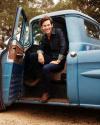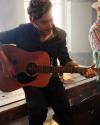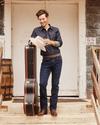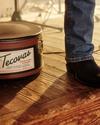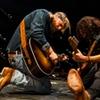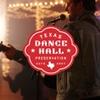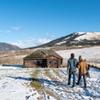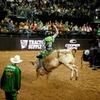
Texas singer-songwriter Thomas Csorba (pronounced CHor-ba) is wise beyond his years. At the ripe old age of 26, he’s a husband, father, and on the verge of releasing his third studio album, Windchimes, recorded in an open studio environment, imperfections and all. We sat down with him to talk about this new album, how life as an artist changes when you become a dad, pieces of generational wisdom, and even where to find a great burger and beer in Dallas.
Plus, watch an exclusive live performance of his new single, “Grieving Angel,” from Historic Twin Sisters Dance Hall.
Q:
Thomas, tell us about the start of your musical journey. Was music a big part of your life growing up? Do you come from a musical family?
A:
Music wasn’t a big priority around the house when I was a kid, but both of my parents definitely like music. My mom always sang me Willie Nelson songs to sleep as a baby, so that's been deeply indoctrinated. The big family-music confluence came from my older brother, Will. As a phenomenal old-time player in his own right, he made it a point to direct me toward the idea of the lineage of music. He instilled in me the idea that my favorite artists had favorite artists, too, and everyone — to some degree — is building on a foundation that their predecessors laid before them.
Q:
Who are your biggest inspirations personally and musically?
A:
I have so many — the list is vast and ever-growing. Personally, my wife and my son are a huge inspiration to me. They keep me going and remind me what this life is all about. There are plenty of writers I love who have served as shadow companions to me over the years: Walt Whitman, Wendell Berry, Mary Oliver, and Cormac McCarthy to name a few. Musically, I’ve found myself doing a deep dive into folk and country music circa 1970. Don Williams has been a huge influence on this new album as well as Willis Alan Ramsey, Tom Rush, Fairport Convention, and Tony Joe White. Some of my forever touchpoints will be folks like Roger Miller, Kris Kristofferson, and John Prine.
Q:
Since your previous, self-titled album, you’ve become a husband and father. How’s that changed your perspective as a man and a songwriter?
A:
It’s been a whirlwind! One side of it is that my priorities have shifted. It’s harder to leave home for a gig if the opportunity isn’t worth it, so I’m learning to say no to things I don’t need to do. That discernment in the “job” side of music has definitely grown. On a creative level, It’s been wonderful. This new record, Windchimes, is about embracing the chaos of this season of life. So my songs reflect the season of life I’m in.
Q:
Windchimes is out April 19th. Tell us more about it!
A:
Windchimes is my favorite thing I’ve ever made. Sonically, I’m proud that we made a record that relies on acoustic instruments, superb musicianship, and doesn’t lean on any fancy studio tricks. Lyrically, the record documents this season of life I’ve found myself in over the past few years. The images in these songs revolve around the mundane moments in life — changing diapers, washing dishes, and sweeping the floor. I think these are things to be embraced, upheld, and recognized as important and holy moments in our lives.
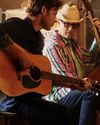
Q:
It was recorded mostly in a single, open room. How does that change/elevate or even create challenges in your recording process?
A:
This kind of recording is definitely a more challenging way to go, but it lends itself to capturing a live, raw feel that you can’t get otherwise. This record is by no means perfect, but all of the little imperfections amount to an honest and timeless feel in the recording. I’m grateful for the musicians who lent their talents. It quite literally wouldn’t exist without them. They absolutely knocked it out of the park.
Q:
You played your new single, Grieving Angel for us solo at historic Twin Sisters Dance Hall. It’s a magical four minutes. At the end, you comment on the acoustics of the room. Can you talk to us about what a difference a “good room” makes? Where are some of your favorite places/venues/environments to play in?
A:
Totally! And this is piggybacking off of the idea of making the album live in a room. There’s so much character in these historic places. The old idea of “if these walls could talk...” isn’t just a cute, fun thing to think about — I believe it has a direct correlation to the feeling and sounds of a recording. Historic rooms like this one — covered in old wood — age like a fine instrument. Twin Sisters Dance Hall is simply that — an instrument.
Watch the exclusive live performance of Thomas Csorba's new single, “Grieving Angel,” from Historic Twin Sisters Dance Hall below and pre-order his new album, Windchimes, here.
Q:
What are some of your favorite places to play and see back home in Dallas? Who’s got the best jukebox in town?
A:
I’m biased by picking this one, but my neighborhood theater, The Kessler, is a wonderful place. The team there has built and curated a great room to watch a show. Some of my favorites to grab a beer or burger in Dallas are Lakewood Landing, Lee Harvey’s, and Keller’s Drive-In. Some old-school Dallas history!
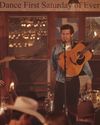
Q:
When you’re on tour, how do you discover local haunts?
A:
Word of mouth mostly. There’s a really fun part of touring that revolves around artists showing each other their favorite spots in random cities across the country. I’ve created my little list over the years from recommendations from the artist I’m opening for, a bandmate, or a friend I know who lives in that town. It’s a pretty special thing — getting to embrace the local scene as best you can each night on tour.
Q:
Any tips for packing for a long road trip?
A:
Well, I always have my boots with me. I’m usually a pretty simple dresser: Some good jeans, a couple of jackets, a good number of shirts (that’s usually where I like to spice things up, and a plethora of socks and boxers. Oftentimes on tour, you feel like a dirty, tired, road-chained vagabond. A fresh pair of socks and underwear goes a really long way.
Q:
What are you thinking about when you dress for the stage?
A:
There’s definitely a nostalgic feeling to what you want out of a person’s look on stage — especially in this type of music. I like to embrace timeless materials like denim, cotton, and leather boots (don’t get me started on performance fabric). I’ve usually got my shirt tucked in, and I’ll never wear a wrinkled shirt. I think there’s a baseline of boxes to check before walking on stage. Simply put, I think artists should care. I think they should dress like they want to be there. I want my kids to look back at old photos of me and not be turned off by a disheveled outfit.
Q:
Do you have a favorite pair of Tecovas?
A:
I have a few pairs for different reasons. The pair of black ostrich Tecovas (The Wyatt in Midnight) that I wore on my wedding day are very special to me. But on a more daily basis, I wear my honey-colored Johnny’s all the time. I pair them with a vintage hand-tooled leather belt that lives in the same color palette.
Q:
What excites you about the music scene right now?
A:
It’s exciting to see how everyone is able to communicate with their fans more directly. For artists like myself, I think it’s the Wild West out there. There’s been a bit of a shift away from traditional press outlets and more of a focus on direct artist-to-fan interaction. The question in that same breath is “How?” — How do we want to open that line of communication with our fans, and how can we create relationships with our fans that are going to be sustainable over the course of a career? I think working through those questions will ultimately be a good thing.
Also, there are a lot of new, young artists entering the scene. With the ability for someone to just throw a song out on social media or a streaming service, there’s just a lot more music out there. That’s exciting to me.
Q:
Who are some other musical acts you think more folks should know about, and are worth grabbing a ticket to go see?
A:
Oh, man! There are so many great folks out there. I was just on tour with Pony Bradshaw, and his songs really blew me away. I also have some friends you might not have heard of: Matt Tedder, Kelley Mickwee, The Inkcaps, and The Tender Things. I’ve also been on a huge Madison Cunningham kick. I’d listen up, she’s going to be remembered as one of the really important ones of our time.
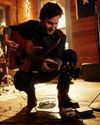
Q:
From “Back up the Hill” you sing, "Am I capable of making something of myself? There's only one way to find out.” There’s a very Don’t Go Gently vibe to that lyric. What does Don’t Go Gently mean to you?
A:
Yeah! It’s funny, years ago, a friend of mine gave me a copy of Steven Pressfield’s cult classic The War of Art. It’s a book that pinpoints the discipline that it takes to get anything done. I can easily apply that idea to my creative process, but as I’ve made this record, I’ve been thinking about what that idea of discipline means in the context of being a husband, a son, and a father. The Dylan Thomas reference is a great one — because it embodies this idea that we are what we do. There’s a lot of talk, but what you’ll be remembered for is your output — not just creatively, but what kind of father, husband, son am I? Those questions can only be answered by action. So I guess it’s time to get to work.
